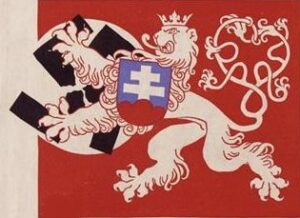The aftermath of World War II and the defeat of Nazi Germany left the country in ruins both physically and morally. Germany was divided into four occupation zones, each controlled by one of the Allied powers: the United States, Great Britain, France, and the Soviet Union. The country’s future was uncertain, and the question of how to deal with former members of the Nazi Party and its collaborators was a pressing issue.
In the early years of West Germany, which was established in 1949, many ex-Nazis played important roles in rebuilding the country. This was partly due to the fact that the new government needed experienced and qualified people to help rebuild the shattered economy and infrastructure, and many of those with the necessary skills were former Nazis. However, the role ex-Nazis played in the early years of West Germany was not without controversy.
One of the most controversial figures was Hans Globke, who served as chief of staff to West German Chancellor Konrad Adenauer from 1953 to 1963. Globke had been a legal adviser to the Nazi regime and was involved in drafting the Nuremberg Laws, which stripped Jews of their rights and led to the Holocaust. Despite his past, Adenauer appointed Globke to his position because he believed him to be a talented and knowledgeable legal expert. However, the appointment caused a great deal of controversy and criticism from many Germans who felt that someone with Globke’s past should not be in such a high position of power.
Another controversial figure was Werner Best, who had been a high-ranking SS officer and was responsible for deporting Jews from Denmark during the war. After the war, Best fled to Argentina but was eventually extradited to West Germany to stand trial. He was later released and went on to become a successful businessman.
Many other ex-Nazis held positions of power and influence in West Germany during the 1950s and 1960s. For example, former SS officer Reinhard Gehlen became head of the West German intelligence agency, and former Nazi Party member Theodor Oberländer was appointed as a government minister.
The role of ex-Nazis in the early years of West Germany was not limited to government positions. Many former members of the Nazi Party were able to regain their positions in society and continue their careers without facing any consequences for their past actions. This was partly due to the fact that many Germans were eager to move on from the war and rebuild their country, and partly due to the fact that the Allied powers were more focused on rebuilding Germany than on punishing former Nazis.
However, not all Germans were willing to forgive and forget. There were protests and demonstrations against the presence of former Nazis in positions of power, and many Germans were outspoken about their desire for justice and accountability. In response, the West German government established a program to investigate former Nazis and punish those who had committed crimes during the war. The program was called the Central Office of the State Justice Administrations for the Investigation of National Socialist Crimes, and it was established in 1958.
Despite these efforts, many ex-Nazis were able to evade justice and continue their lives without facing any consequences for their past actions. This has led to ongoing debates in Germany about how to deal with the legacy of Nazism and the role that former members of the Nazi Party played in rebuilding the country after the war.
In conclusion, the role of ex-Nazis in the early years of West Germany was complex and controversial. While many former members of the Nazi Party were able to use their skills and experience to help rebuild the country, their presence in positions of power was deeply troubling to many Germans who had suffered under Nazi rule.
Menu

